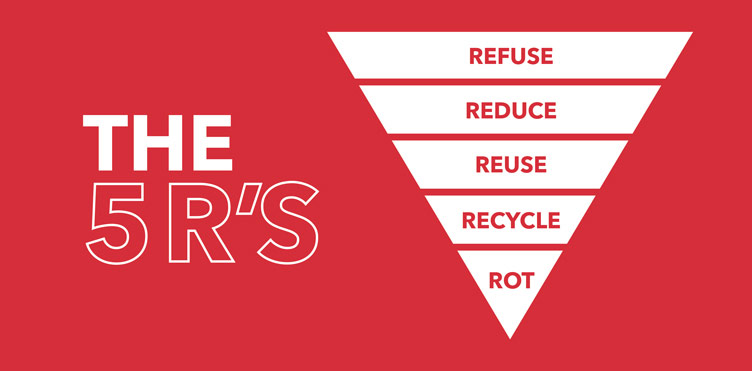Reducing waste at UNB

At UNB our first priority of waste management is reducing the amount of waste we produce. If we all take action and refuse products we do not need, reduce our consumption where possible, and reuse what we can, there will be less waste to recycle or send to rot in the landfill.
Centrally-located waste bins
An emerging trend at other institutions aiming to increase their diversion rates is to provide centrally located waste bins that allow individuals to sort their trash based on a three-stream system: waste, paper and refundable materials. This approach provides people streaming options when disposing of waste.
Three-stream waste management system
UNB has been implementing a three-stream waste management system: Waste, paper and refundable material. We encourage UNB community members to recycle what is possible on campus and utilize external recycling options for the remainder of your waste.
Three-stream items for campus:
- Paper: White and coloured paper, cardboard, paperback books, newspapers, flyers, boxboard, phonebooks, magazines, notebooks (with metal removed)
- Refundable: Aluminum cans, glass beverage bottles, plastic beverage bottles and jugs
- Waste: Tim Horton's cups, foil-lined food wrappers (on granola bars, chip bags), soiled paper and cardboard, non-recyclable plastics (bubble wrap, cling wrap), tissues and paper towel, glass (except bottles)
Plastics recycling
You might have noticed that UNB does not offer recycling for plastics that are not beverage containers. Unfortunately, all plastics (other than beverage containers) must be sorted as waste on campus. However, you do have some options if you would like to recycle your plastics:
- Take them home to your blue bin (if you live off campus) for curbside pick-up. Plastics labeled 1 through 7 are recyclable in Fredericton.
For more information on plastic recycling in Fredericton see curbside recycling (frequently asked questions).
Compost
Composting is not offered by the City of Fredericton, and UNB does not currently have the capacity to process compost, therefore food must be sorted as waste on campus. However, we encourage you to use alternative methods of composting.
- Bring home your organic waste daily and place it in your backyard composter or a private composting service bin.
- Ask to bring your home compost to a community garden or local farm who will put your organic waste to use.
Electronics recycling
UNB does not currently collect personal electronic devices for recycling at this time. Each year during Sustainability Month in October ITS and UNB Sustainability work together with Electronics Products Recycling Association (EPRA) to host an electronic recycling event.
However, you can recycle your electronics and much more with EPRA by dropping items off at their various locations.
Battery recycling
Battery recycling is available to the UNB community on campus.
Fredericton
UNB Sustainability encourages faculty and staff teams to collect batteries in their office spaces and bring them to one of the Call2Recycle locations across campus.
If teams have a larger box of batteries for disposal, it may be easier to have a team member take it to a local drop-off location.
Saint John
To make it easy for you to dispose of batteries, UNB Saint John has Call2Recycle boxes located in various departments around campus.
If your unit collects a lot of batteries you can make a request for a Call 2 Recycle box from ISS at itservicedesk@unb.ca. Once the box is filled, arrange with the mailroom for the courier on the box to pick it up and then request a new box.
See the Campus Sustainability Map for recycling locations on campus.
